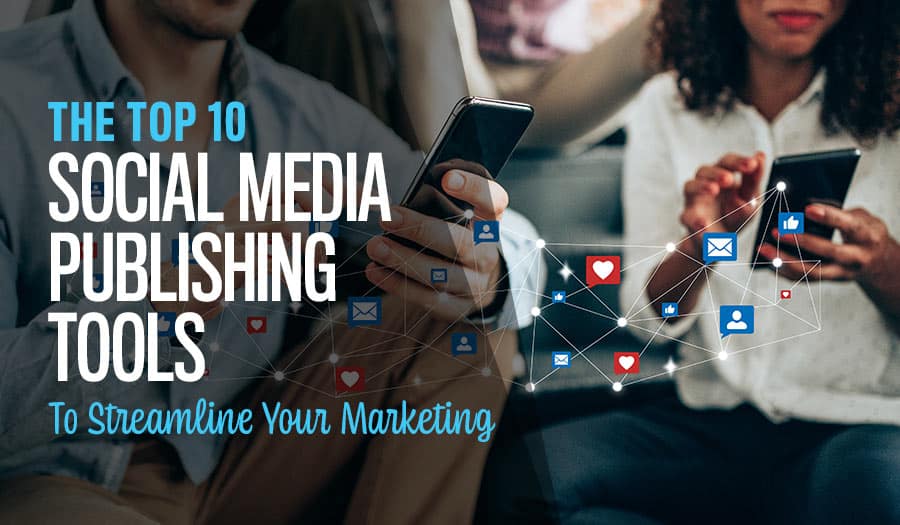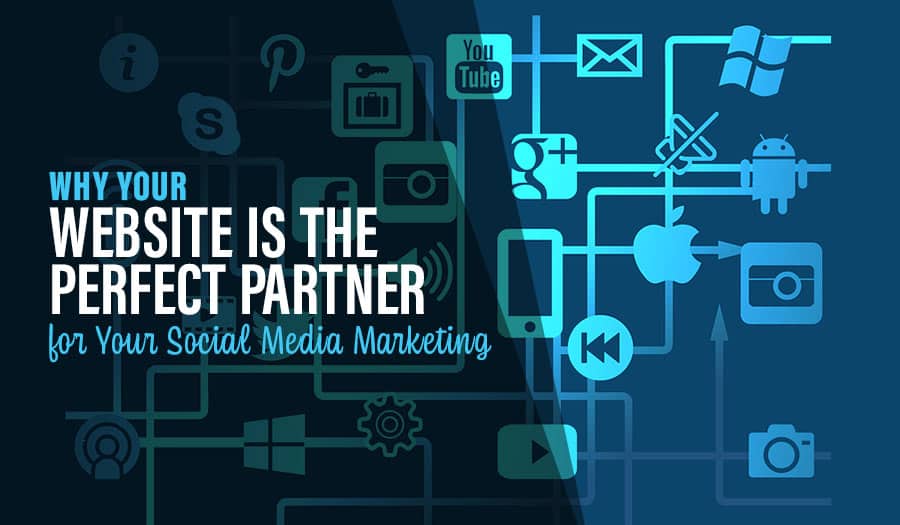Social media marketing without top social media publishing tools has always been challenging, and it’s not getting easier any time soon. With the 6,000 tweets sent every second and the 7.5 million blog posts published each day, saying that you have competition is now an understatement.
Managing a social media campaign can easily become a nightmare, especially once your audience and platform grow. Juggling between hunting for premium content, posting it across different platforms, and analyzing the subsequent reports is no walk in the park.
It doesn’t always have to be this way. What if we told you there’s a solution that can do all the heavy lifting on your behalf?
Enter Social Media Management Tools
Social media management software was the perfect present for businesses of all, sizes-properly wrapped and delivered with love.
The days of moving across tabs, posting inconsistently across platforms, tired nights, burnouts, confusion, and chaos are now over. With an effective publishing tool. A business can get:
- Unified communication from a single point across multiple platforms
- Comprehensive analytics all in one dashboard
- Social media listening across different platforms
- Competitor tracking across various platforms
Benefits Of Using A Single Tool
There’s no doubt that marketing tools are crucial. However, there’s a catch. In your search for the perfect tool, you may find yourself falling into the trap and lure of multiple tools.
Hey, the more, the merrier, or so we think. When it comes to marketing tools, less is more. Remember, you embraced marketing tools to remove complexity, not add to it. Using a single tool will help you.
Reduce Clutter
Worse than not using any social media marketing tools is having dozens of them running on siloed systems and fragmented interfaces.
Using a single tool gives you simplicity, which we’ve come to learn is the greatest sophistication. What more could you ask for a single dashboard, CRM and unified analytics?
Customer Centricity
Without a single point of truth, customer centricity becomes a distant dream. Multiple systems will focus your attention on everything but the customer.
Putting your customer at the centre of your campaign has never been easier with a single dashboard, unified communication and a focal point for analytics.
Cost Savings
It may not seem like it, but running multiple systems is relatively expensive in the long run. That $14 here, $55 there, and some $25 in between may eventually add up into some significant figure. Every day you use a unified system is a dollar saved.
Here Are The Top 10 Social Media Publishing Tools To Streamline Your Content Marketing
So that you don’t spend hours reading reviews on Google, we’ve combined a list of some of the top social media publishing tools, their pros, cons and pricing. They include:
Top 10 Social Media Publishing Tools To Streamline Your Content Marketing
1. Buffer
Buffer is a few points shy of everything a social media campaign ever needed. That’s why it’s trusted by over 75, 000 brands worldwide.
The concept of Buffer is a system that allows you to select, schedule and automate your delivery of posts across different platforms and audiences at a pre-determined time. It also sources all the analytics from your platform and brings them under one dashboard.
Pros
You won’t be reading reviews for long to realize that Buffer gives you enough reasons to consider adding it to your campaign. Some of these include.
- Wide Compatibility
Buffer supports content marketing across several platforms. This includes Facebook, Twitter, LinkedIn, Instagram and Pinterest for Pro Users.
- Intuitive Interface
Buffer designed their interface with simplicity in mind; you don’t need to be an expert to operate it. Most of the features are in a single dashboard, making it easier for you to operate.
- Multiple Features
One of Buffer’s most significant selling points is its wealth of features. Buffer offers automated publishing, collaboration tools, post scheduling, social media integration and analytics, among other features.
Cons
One of Buffer’s greatest shortcomings is its few glitches that happen occasionally. Other than that, Buffer has almost everything going for it.
Pricing
Buffer offers one of the best value for money this side of great publishing apps. It has a forever free plan for starters, then $15, $99, $199, $399 a month onwards.
2. Sendible
Sendible is to agency social media management what beer is to parties. If you run an agency with several clients, Sendible may be one of the best things to happen to your business in a long time.
The concept of this software is for your agency to manage, automate and track your content campaign on social media from a single point.
Pros
Sendible has many selling points. Some of its most outstanding include:
- Convenient Deployment
Since it’s a SaaS, your team can deploy Sendible from the cloud wherever they are. This means that location is no longer an impediment, and your agency can manage its content marketing from different devices.
- Centricity
Sendible is the textbook definition of a unified solution. This software is good at taking all the intricacies of your content marketing and bringing them all under one dashboard.
- Integrations
To make it into the ultimate one-stop-shop, Sendible offers a wealth of integrations and optimizations. These include a YouTube Search, royalty-free image search and Canva Graphics editor.
Cons
Sendible is a great solution, but the teams have to work on some of its glitches, especially when it comes to scheduling posts.
Features
The Sendible interface is buzzing with features. These include Competitor analysis, competitor monitoring, automated tracking, ROI tracking, channel attribution, and collaboration.
Pricing
Sendible offers a 30-day free trial. They offer several payment options from $29 a month to $99, $199, $299 and enterprise pricing.
3. HootSuite
HootSuite is a social media campaign manager’s dream come true and a little bit more. With an estimated 18 million users worldwide and 800 out of 1000 Fortune 500 companies, the only thing that precedes HootSuite is its reputation.
HootSuite is one of the most extensive publishing platforms. It manages publishing, scheduling, analytics, reporting and tracking, just to mention a few.
Pros
HootSuite has a lot of advantages. These include:
- Compatibility
HootSuite is the king of compatibility. With this one platform, your business can connect to more than 35 social networks, including Facebook, Instagram, Twitter and LinkedIn.
- Convenient Deployment
Given that HootSuite is cloud-based, your company and its teams can launch it from any location and multiple ranges of devices.
- Analytics
HootSuite takes analytics to a whole other level. With HootSuite, you get to leverage over 200 metrics to get insight into your social media marketing campaign, which helps you make more informed decisions.
- Campaign Tracking
HootSuite is one of the best platforms to track your campaign; HootSuite enables you to track hashtags, mentions, engagements and followers. This keeps your campaign in the know and helps in making informed decisions.
Cons
Reviews show that one of HootSuite’s most significant shortfalls is its interface which is not as intuitive as other interfaces in the market.
Features
There is no shortage of features as far as HootSuite is concerned. Quite to the contrary, there are excesses. These include analytics/ROI tracking, content management, A/B testing, automated publishing and competitor tracking.
Pricing
HootSuite has both a free plan and a 30-day free trial. From there, using this will set your business $49, $129, $599 per month.
4. Tailwind
In social media marketing, a picture is worth a thousand words and a few bucks. Tailwind sets to make this a reality for your business too. How? Tailwind is a platform that aims to bring your visual marketing on Instagram and Twitter to the next level.
With Tailwind, you can schedule posts across different platforms and target and track leads and engagement on visual social media while automating your publishing at the same time.
Pros
Tailwind has multiple advantages. These include:
- Specializes In Visual Marketing
One of Tailwind’s greatest selling points its specialization. Its features revolve around Instagram and Pinterest, enabling businesses focused on improving this aspect of their marketing to benefit.
- Intuitive Interface
Tailwind’s interface is one of the simplest to use. It has a drag and drop interface that makes posting multiple pictures easy and automated scheduling that does all the heavy lifting for you.
Cons
Tailwind’s greatest strength also doubles as its weakness. Its excellence in visual content marketing may sometimes make it mediocre when it comes to other aspects of marketing.
Features
Tailwind has more than enough features to bring your Instagram marketing to life. These include influencer tracking, trend analysis and tracking, analysis and reports and social media marketing.
Pricing
Tailwind offers a free trial version. Onwards you can pay a Pinterest Plus for $14.99 0r $9.99 a month or an Instagram Plus for the same amount billed annually, among other payment options.
5. Loomly
Loomly is any marketing campaign’s greatest weapon against clutter, chaos and confusion. This tool will help your business organize your marketing in ways you couldn’t deem possible.
This tool’s functionalities can be condensed into three words: efficient workflow management. Loomly promises allow you to schedule your posts well into the future, plan your calendar, and handle next month’s content marketing.
Pros
Loomly has a lot going for it. Some of the advantages of using this tool include:
- Workflow Management
Workflow management is this tool’s most significant selling point. If you’re having trouble staying ahead of your content marketing, Loomly was created just for you.
- Simple Interface
Interfaces don’t get simpler than this. Anybody can operate this tool regardless of their expertise or technical experience.
- Engagement Tracking
Not only does Loomly allows you to plan and schedule your content marketing well into the future, but it also enables you to track your content and engagement with the audience.
Cons
It’s almost heartbreaking knowing that Loomly doesn’t integrate with Instagram. However, it integrates with Facebook, LinkedIn, Twitter, and many other networks.
Features
Loomly’s long list of features includes post scheduling, customer engagement, customer segmentation, keyword filtering and social media monitoring.
Pricing
Loomly offers a free trial and several pricing options starting from $25 a month.
6. Sprout Social
An article about content publishing tools is always incomplete without mentioning Sprout Social. It’s the textbook definition of a one-stop shop and one of the few management tools that offer a CRM.
Pros
This tool offers many a lot of benefits. These include:
- Simple Interface
Sprout Social has one of the most straightforward interfaces of all management tools. Everything you need is always on a single dashboard or within reach.
- Data Analysis
Sprout Social leaves little to chance when it comes to data analysis. This platform enables your business to segment and analyzes data from a demographic and geographic point of view.
- One-Stop-Shop
Sprout Social ensures that it’s an umbrella for all your content marketing needs. It centralizes your entire campaign, its passwords, engagement, and platforms into a simple-to-use interface.
Cons
Reviews reveal that many Sprout users find it to be relatively pricey. Other than that, it’s mostly fine.
Features
Sprout Social’s most significant selling point above its centricity are its reports and insights. Its features include configurable alerts, segmentation, competitive analysis and competitor monitoring.
Pricing
Sprout Social has a free trial version. From there onwards, it will set you back $99, $149, $249 all per user/month
7. Zoho Social
Zoho Social is probably one of this list’s most affordable comprehensive managers. It’s everything you ever wanted in a management tool, but this time at a price everybody can afford.
Zoho brings all your content management under one dashboard. This is scheduling, planning, publishing, engagement and analytics.
Pros
The advantages that come with using Zoho social include:
- Integrations
Zoho allows you to extend its functionality by adding other Zoho integrations such as Zoho Workspace, Zoho Campaigns and Zoho CRM.
- Team Work and Affordability
Zoho is a pro-team management tool. Its $15 basic plan accommodates two team members, and you’re always free to add more at $10 each.
- Scalability
Zoho Social’s pricing, features and abilities have been built to accommodate the growth of a business’s content marketing needs.
Cons
Zoho has a lot going for it, but it needs to work on its customization across platforms and customer support.
Pricing
Zoho has a free version and a free trial option. Other payment options start at $15 a month.
8. Later
Instagram has evolved into a powerful marketing platform, and in its wake sprouted a myriad of tools seeking to make marketing on IG easier. Later is one of them.
Later started as a tool focused solely on automating your content marketing on Instagram. However, it has grown into a favourite for visual marketing management across different platforms such as Facebook, Pinterest and Twitter.
Pros
There’s a reason Later is a popular visual marketing tool. Its advantages include:
- Analytics
Later offers some of the best visual marketing reporting, analytics and social media listening in the market.
- Scheduling
Later allows you to schedule your content far into the future and automate the publishing of visual content across platforms and at your desired time.
- Intuitive Interface
Later has a drag-and-drop interface. This not only makes it one of the easiest to use but also makes managing workflow easier.
Cons
Like Tailwind, You may find Later’s abilities in management outside visual content to be lacking.
Features
Some of Later’s most prominent features include automated publishing, content management, multi-account management and reporting/analysis.
Pricing
Later has a free version, no free trials and options from $9, $19, $29 and $49, including enterprise pricing.
9. Crowdfire
Crowdfire is the best content management tool as far as small and growing businesses are concerned. It caters for businesses that can’t afford large management teams or pay a premium for established content management software.
Pros
- Content Curation
Crowdfire helps your campaign source and use content that is relevant to your marketing, client and prospective audience.
- Analytics
Crowdfire offers a wealth of reports and has an effective social media listening platform.
- Scheduling and Automation
Crowdfire offers top-of-the-range content calendar scheduling, and the subsequent execution from automation is excellent.
Cons
One complaint from reading the reviews is that Crowdfire makes you pay for most of the features you need.
Features
Key features of Crowdfire include its content publishing, post analytics, hashtag recommendations, and customer service management.
Pricing
Crowdfire has both a free version, offers free trials and starts at $9.99 a month.
10. Edgar
Edgar is your one-stop shop for everything automation and a little bit more. This is the management tool if you want to automate your workflows.
Pros
Edgar is great for scheduling content and Twitter recycling and has a great social media library that provides an evergreen flow of content.
Cons
Most of the complaints about Edgar revolve around the issue of it being technical and requiring a learning curve.
Features
Some of Edgar’s best-selling features include its automated publishing, post scheduling, content management and multi-account management.
Pricing
Edgar does not have a free version and costs $49 per feature per month. However, it offers a 30-day money-back guarantee.
Where We Come In
Before you start your social media campaign, you need a website. That’s where PixelFish comes in. Our team of experts help develop websites that will take your business to the next level. For more information, contact us today and let us be part of your story.
Take your business to the next level with a Pixel Fish Website.
Check out some of our latest Website Design projects.
Further Reading
5 Reasons to Customise Your Social Media Strategy for Every Channel
How to Use Instagram to Drive Website Traffic for your business
Twitter Vs Facebook Vs Instagram Vs LinkedIn: Which is Right for You?
Read More
5 Steps to a Small Business Marketing Strategy Anyone Can Follow
How to Build a Blog that Actually Helps Your Inbound Marketing
5 Steps to Optimise Your Digital Marketing on a Limited Budget
5 Genuine Ways How Influencer Marketing Drives Results
5 Effective Ways to Nurture Your Leads and Boost Engagement
How to Keep Your Website Relevant so Your Customers Return for More
How to Set Up A YouTube Channel For Your Business
Facebook Reviews vs LinkedIn Reviews vs Google My Business Reviews
How to Start a Successful Blog to Boost Your Business Website
How regularly should my business publish on Social Media?
How to Create a Content Schedule for Business Blogging Success
Pros and Cons Of Using A Live Website Customer Chat
Why Displaying Social Media Reviews On Your Website Is Great For Business



